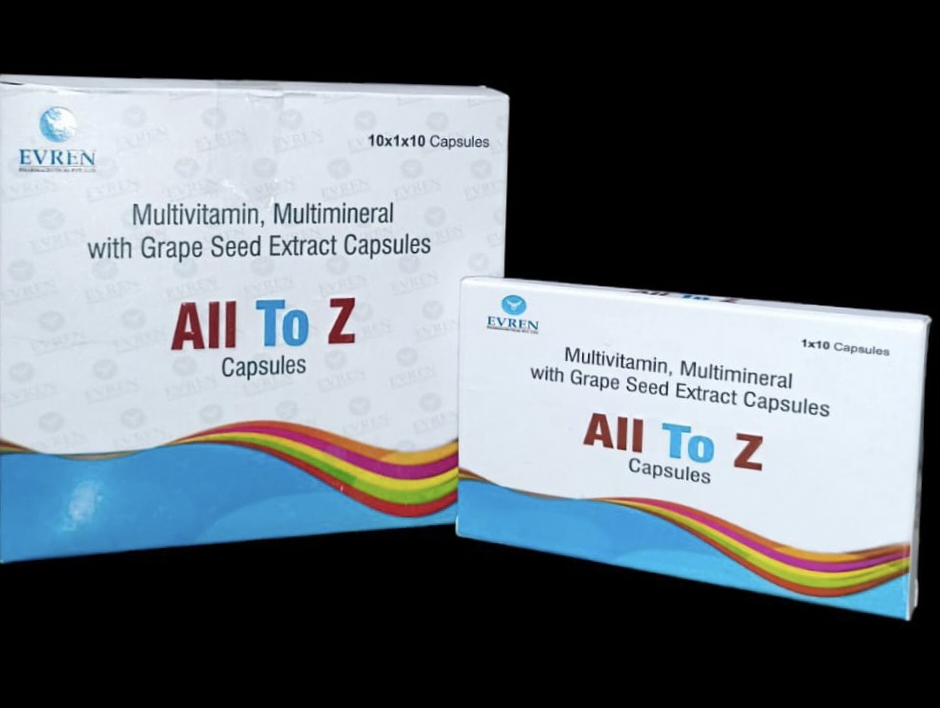ALL TO Z

Aug 19, 2024
The Power of Multivitamin, Multimineral, and Antioxidant Supplements: A Comprehensive Guide
In today's fast-paced world, maintaining a balanced diet rich in essential nutrients can be challenging. This is where multivitamin, multimineral, and antioxidant supplements come into play. These supplements offer a convenient way to fill nutritional gaps, support overall health, and protect the body from oxidative stress. But what exactly are these supplements, and how do they benefit your health? Let's dive in.
What Are Multivitamin, Multimineral, and Antioxidant Supplements?
-
Multivitamins: Multivitamins are dietary supplements that contain a combination of vitamins, each playing a vital role in maintaining bodily functions. They typically include vitamins A, C, D, E, and K, as well as B-complex vitamins like B6, B12, niacin, riboflavin, and folic acid.
-
Multiminerals: Multiminerals include essential minerals like calcium, magnesium, zinc, iron, and potassium. These minerals are crucial for various physiological processes, including bone health, muscle function, and the regulation of blood pressure.
-
Antioxidants: Antioxidants are compounds that protect the body from oxidative stress caused by free radicals. Common antioxidants include vitamins C and E, selenium, and plant-based compounds like flavonoids and carotenoids.
The Benefits of Multivitamin, Multimineral, and Antioxidant Supplements
1. Nutrient Coverage:
- Even with a well-balanced diet, it can be difficult to consume all the essential nutrients in the right amounts. Multivitamin and multimineral supplements provide a broad spectrum of nutrients that help cover potential gaps in your diet.
2. Immune Support:
- Vitamins C and D, along with zinc, are known to boost the immune system, helping your body fend off infections and illnesses. Regular intake of these nutrients can help maintain a strong immune response.
3. Energy and Vitality:
- B vitamins play a crucial role in energy production by helping convert food into energy. A deficiency in these vitamins can lead to fatigue and weakness, so supplementation can help maintain energy levels.
4. Bone and Muscle Health:
- Calcium, magnesium, and vitamin D are essential for maintaining strong bones and muscles. They help in bone formation, prevent bone loss, and ensure proper muscle function.
5. Heart Health:
- Antioxidants like vitamin E, selenium, and beta-carotene help reduce oxidative stress, which is linked to cardiovascular diseases. Omega-3 fatty acids, often included in these supplements, also support heart health by reducing inflammation and lowering cholesterol levels.
6. Skin, Hair, and Nail Health:
- Biotin (vitamin B7), vitamin E, and zinc are often included in multivitamin formulations to support healthy skin, hair, and nails. These nutrients promote collagen production, skin elasticity, and hair growth.
7. Eye Health:
- Vitamins A, C, E, and minerals like zinc and selenium are essential for maintaining good vision and protecting the eyes from age-related degeneration. Lutein and zeaxanthin, often included in these supplements, specifically support eye health.
Antioxidants: The Protectors Against Oxidative Stress
Oxidative stress occurs when there is an imbalance between free radicals and antioxidants in the body. This can lead to cellular damage, contributing to aging and the development of chronic diseases like cancer, heart disease, and diabetes. Antioxidants neutralize free radicals, protecting cells from damage and reducing the risk of disease.
Some key antioxidants found in supplements include:
- Vitamin C: Supports the immune system and skin health while protecting against oxidative damage.
- Vitamin E: Protects cell membranes and is essential for skin and eye health.
- Selenium: A powerful antioxidant that helps prevent cellular damage and supports thyroid function.
- Beta-Carotene: Converts to vitamin A in the body, supporting vision, skin health, and immune function.
Who Should Consider Taking These Supplements?
While a well-rounded diet is the best way to obtain nutrients, certain groups may benefit more from multivitamin, multimineral, and antioxidant supplements:
- Elderly Individuals: As people age, nutrient absorption can decline, making supplementation beneficial.
- Pregnant and Breastfeeding Women: They require higher levels of certain nutrients, like folic acid, iron, and calcium.
- People with Dietary Restrictions: Vegetarians, vegans, and those with food allergies may have difficulty getting all essential nutrients from their diet alone.
- Individuals with Chronic Health Conditions: Those with conditions like osteoporosis, heart disease, or digestive disorders may benefit from targeted supplementation.
Considerations Before Taking Supplements
While these supplements can be beneficial, it's important to approach them wisely:
- Consult a Healthcare Provider: Before starting any supplement, especially if you have a medical condition or take other medications, consult with your healthcare provider to ensure safety and avoid potential interactions.
- Quality Matters: Choose high-quality supplements from reputable brands to ensure that you're getting effective and safe products.
- Dosage: Follow the recommended dosage on the label or as advised by your healthcare provider. More is not always better, and excessive intake of certain vitamins and minerals can cause adverse effects.
Conclusion
Multivitamin, multimineral, and antioxidant supplements can be valuable tools in supporting overall health, filling nutritional gaps, and protecting the body from oxidative stress. However, they should complement, not replace, a healthy diet. By understanding their benefits and using them wisely, you can harness the power of these supplements to enhance your well-being and lead a healthier life.
4o